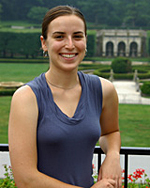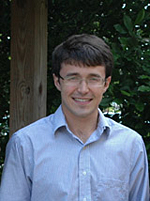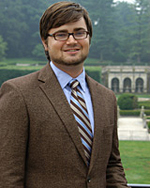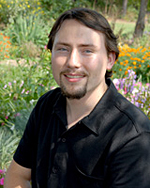



- Rozovsky wins prestigious NSF Early Career Award
- UD students meet alumni, experience 'closing bell' at NYSE
- Newark Police seek assistance in identifying suspects in robbery
- Rivlin says bipartisan budget action, stronger budget rules key to reversing debt
- Stink bugs shouldn't pose problem until late summer
- Gao to honor Placido Domingo in Washington performance
- Adopt-A-Highway project keeps Lewes road clean
- WVUD's Radiothon fundraiser runs April 1-10
- W.D. Snodgrass Symposium to honor Pulitzer winner
- New guide helps cancer patients manage symptoms
- UD in the News, March 25, 2011
- For the Record, March 25, 2011
- Public opinion expert discusses world views of U.S. in Global Agenda series
- Congressional delegation, dean laud Center for Community Research and Service program
- Center for Political Communication sets symposium on politics, entertainment
- Students work to raise funds, awareness of domestic violence
- Equestrian team wins regional championship in Western riding
- Markell, Harker stress importance of agriculture to Delaware's economy
- Carol A. Ammon MBA Case Competition winners announced
- Prof presents blood-clotting studies at Gordon Research Conference
- Sexual Assault Awareness Month events, programs announced
- Stay connected with Sea Grant, CEOE e-newsletter
- A message to UD regarding the tragedy in Japan
- More News >>
- March 31-May 14: REP stages Neil Simon's 'The Good Doctor'
- April 2: Newark plans annual 'wine and dine'
- April 5: Expert perspective on U.S. health care
- April 5: Comedian Ace Guillen to visit Scrounge
- April 6, May 4: School of Nursing sponsors research lecture series
- April 6-May 4: Confucius Institute presents Chinese Film Series on Wednesdays
- April 6: IPCC's Pachauri to discuss sustainable development in DENIN Dialogue Series
- April 7: 'WVUDstock' radiothon concert announced
- April 8: English Language Institute presents 'Arts in Translation'
- April 9: Green and Healthy Living Expo planned at The Bob
- April 9: Center for Political Communication to host Onion editor
- April 10: Alumni Easter Egg-stravaganza planned
- April 11: CDS session to focus on visual assistive technologies
- April 12: T.J. Stiles to speak at UDLA annual dinner
- April 15, 16: Annual UD push lawnmower tune-up scheduled
- April 15, 16: Master Players series presents iMusic 4, China Magpie
- April 15, 16: Delaware Symphony, UD chorus to perform Mahler work
- April 18: Former NFL Coach Bill Cowher featured in UD Speaks
- April 21-24: Sesame Street Live brings Elmo and friends to The Bob
- April 30: Save the date for Ag Day 2011 at UD
- April 30: Symposium to consider 'Frontiers at the Chemistry-Biology Interface'
- April 30-May 1: Relay for Life set at Delaware Field House
- May 4: Delaware Membrane Protein Symposium announced
- May 5: Northwestern University's Leon Keer to deliver Kerr lecture
- May 7: Women's volleyball team to host second annual Spring Fling
- Through May 3: SPPA announces speakers for 10th annual lecture series
- Through May 4: Global Agenda sees U.S. through others' eyes; World Bank president to speak
- Through May 4: 'Research on Race, Ethnicity, Culture' topic of series
- Through May 9: Black American Studies announces lecture series
- Through May 11: 'Challenges in Jewish Culture' lecture series announced
- Through May 11: Area Studies research featured in speaker series
- Through June 5: 'Andy Warhol: Behind the Camera' on view in Old College Gallery
- Through July 15: 'Bodyscapes' on view at Mechanical Hall Gallery
- More What's Happening >>
- UD calendar >>
- Middle States evaluation team on campus April 5
- Phipps named HR Liaison of the Quarter
- Senior wins iPad for participating in assessment study
- April 19: Procurement Services schedules information sessions
- UD Bookstore announces spring break hours
- HealthyU Wellness Program encourages employees to 'Step into Spring'
- April 8-29: Faculty roundtable series considers student engagement
- GRE is changing; learn more at April 15 info session
- April 30: UD Evening with Blue Rocks set for employees
- Morris Library to be open 24/7 during final exams
- More Campus FYI >>
12:32 p.m., June 5, 2009----Graduating fellows presented the results of their thesis research during the Longwood Graduate Program in Public Horticulture research seminars held May 29 at Longwood Gardens in Kennett Square, Pa.
Topics included community tree planting, the effects of natural disasters on public gardens, historical preservation and public horticulture, and expanding a program of botanical exchange between the United States and China.
Seminar presenters were graduating fellows Jackie Bergquist, of Hayward, Calif., Dan Burcham, of Montpelier, Ohio, Matt Quirey, of Blackwell, Okla., and Barnabas Seyler, of Walkersville, Md.
Bergquist discussed “The Development of a Natural Disaster Planning Template for use in Plant Collections Management.” She noted that while living collections in botanical and public gardens usually benefit from contact with metrological elements, such contact can also cause destruction during extreme weather conditions.
Bergquist's research resulted in the formulation of a template to aid public gardens in natural disaster planning process.
Burcham's research topic was “Urban Forest Management for Multiple Benefits: An Analysis of Tree Establishment Strategies Used by Community Tree Planting Programs.” While adequate research is available for describing the nature, extent and valuation of the amenities provided by urban trees, Burcham noted additional investigation is required concerning the management strategies used to sustain these benefits.
His research indicated that universal strategies for advancing tree establishment include having a well-defined program mission, reliable financial support, community involvement, program standards and polices and a clear tree planting workflow.
Quirey presented his research on “An Analysis of Historic Significance and Its Impact on Public Horticulture Institutions.” He noted that preservations efforts in America did not garner national attention until the Antiquities Act of 1906, and that subsequent legislation, National Parks Service programs and non-profit advocacy group have confirmed an increasing interest to value places of historical significance, including cultural landscapes.
In light of potentially decreased funding due to tight economic constraints, Quirey's research indicated that to continue their role as integral parts of their communities, public horticultural institutions must present a clear understanding of the importance of considering historic significance in the decision making process.
Seyler focused his thesis efforts on “Sino-American Botanical Exchange: Encouraging Greater Botanical Collaboration Through a Mutually Beneficial Staff Exchange Program.” His study investigated the potential development of a Sino-American horticultural staff exchange program modeled after the Interchange Fellowship/Martin McLaren Scholarship program as administered by the Garden Club of America and the Royal Horticultural Society.
Besides creating a resource network available to non-associated individuals or institutions wishing to collaborate, Seyler noted that the proposed exchange program will unite the resources and mutual interests of public gardens in the United States and China, coordinate their abilities, and keep them connected to the best minds and future horticultural leaders within their prospective countries.
Robert Lyons, professor of landscape horticulture and director the Longwood Graduate Program in Public Horticulture, said the seminars were well received by the 60 attendees.
“There was no shortage of questions,” Lyons, who also is director of UD's Center for Public Horticulture, said. “I believe the diversity of topics kept the audience members focused on each speaker's talk throughout the afternoon.”
Lyons noted that the seminars give students the opportunity to articulate the results of their research to their professional peers and colleagues in an atmosphere of constructive scrutiny.
Recent changes in the Longwood Graduate Program, Lyons said, include the incorporation of a “Professional Outreach Project,” whereby all 10 grad students work together to help a client organization.
“Students first identify an area in public horticulture that they wish to learn more about outside of the classroom, then they match their interests with an organization that needs such assistance, identifying tangibles that the organization may not have been able to produce without the students involvement,” Lyons said. “To date, we have worked with Fairmount Park in Philadelphia, Welkinweir Aboretum in Pottstown, Pa., and are now working with Bartram's Garden in Philadelphia.”
Article by Jerry Rhodes


